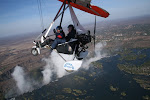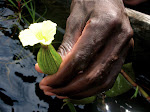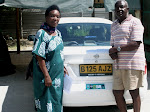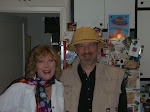NEAR LINYANTI SWAMP, Botswana -- The way to the airstrip by King's Pool is along sandy tracks, past abandoned termite mounds where baboons perch and rubberneck like old sentries inspecting passers-by. We have to hurry to meet the Cessnas; they will arrive soon to lift us off to another safari destination to cap this eight-day adventure in one of the last great wilderness areas on the planet.

But Richard Avilino, our guide from Maun, Botswana, has other ideas.
There is, after all, a bit of time to make the flights. His left hand alternates between yanking the stick shift of the open Land Rover and grabbing the radio microphone to whisper information with other guides. He constantly scans right and left as he drives, and he leans over his door to look for tracks. A Seattle Post-Intelligencer columnist once described him as "the all-purpose human Swiss Army knife."
Was she ever right. He has the ability to track, to drive through water up to the floorboards, to identify flora and fauna from unimaginable distances, to handle exasperating logistics (lost luggage from Johannesburg, South Africa), to answer every kind of annoying city-folk question with patience and grace and, not least, to merrily mix gin and tonics ("sundowners") on the hood of the Land Rover at sunset.
He led us one morning to the matted yellow grass where two male lions rested not 15 feet away ("Aren't we too close?" several of us muttered nervously) and again in the lush Moremi Game Reserve, where a herd of elephants thundered across a waterway.
In those moments, I could see our guide flash a quick smile to himself. He had succeeded for the guests, which is what his company, Wilderness Safaris, did in every respect.
Mr. Avilino says nothing for a while. The six of us thrown together as a group on the advertised "Great Botswana Journey" know to be quiet.
Then he sees them. Lion tracks.
Mr. Avilino reads them, backs up and takes off. We're holding on tight when he comes to an abrupt stop -- for a nanosecond. Off we shoot into the bush, turning, pushing forward, backing up over logs, racing through thorny branches that leave us huddled for cover under our ponchos.
And then he sees them! Two females and an adolescent male lion are lounging nearby. Amazing. We are in awe at our guide's gifts of grit and ingenuity -- and the scene before us. We snap away.
"What a fabulous end to our Linyanti stay," I think to myself, but a drama has just begun.
Mr. Avilino radios to alert other guides of our location. But it's not going to be a tourist jamboree. During my trip in the high season in July, I saw only a handful of people in other trucks in the remote areas. It felt as though we had the whole place to ourselves, except, of course, for the elephants thunder-cracking 12-foot trees in half for supper, the hippos sloshing and grunting in the water outside the deluxe tented structures (complete with hot showers and flush toilets) and the lions that roared so loudly in camp one night that I thought I felt the tent shaking. But maybe it was just my knees.
One lion sits up, alert, and gazes right. Mr. Avilino listens, and then he knows. We tourists don't have a clue, but off in the distance, out of our earshot, a massive herd of Cape buffalo is on the move, and Mr. Avilino senses a hunt is at hand. Off we race in search of the herd.
There they are: Scores of buffalo moving en masse. It's not quite a stampede, but the buffalo clearly trot as if something is up. And then we see her. Mr. Avilino was right. Coming out of nowhere, a lioness darts toward the herd. We can't believe our eyes. Will there be a kill?
The radio exchange lets us know that one female remains stretched out, resting back at the other spot; the male is on its way. The lioness in front of us is alone, without her pride mates to help corner the herd. She moves in, anyway: an elegant, fearless stalker. In a flash, the two elder buffalo reverse the action and charge the lioness, full force. And in that instant I see with my own eyes that the kings and queens of the savanna can turn tail and run just like the rest of us chickens.
No blood. No guts. No buffalo calf or lion ripped open.
I have to confess some relief. Maybe a kill would come later. The lioness would need her pride mates to corral unlucky targets for a feast, and we can't wait. The planes will be here soon.
Off we zip, up to 40 mph, racing over the sandy paths, bouncing higher than ever on the truck's seats, moving under a cloudless blue sky, having the time of our lives in a place where no phones ring, no computers hum, no traffic pounds that steady, hideous drone.
It is a place where animals roam freely and trumpet their sounds, where a human heart finds home in the underlying stillness and the magical power of the moment.
If you go...
• Why Botswana: The big draw to Botswana for me was the Okavango Delta, a vast wetland that has been called the last Eden. With water flowing from the Angola highlands, the Okavango River reaches out to form the world's largest inland delta, covering more than 8,500 square miles and drawing a bounty of birds and wildlife.
We saw hippos, elephants, warthogs, giraffes, crocodiles, zebra, impalas, Cape buffalo, lions, hyenas, wattled cranes, lilac-breasted rollers (Botswana's glorious national bird) and African fish eagles.
• When to go: Now is the right time to make your plans to visit in the high season -- June, July and August. In those chilly African winter months when the landscape is relatively barren, it is easier to see the animals.
• The outfitter: Wilderness Safaris, specializing in southern Africa, operated the camps where we stayed and had everything moving on schedule and with what looked like effortless efficiency (www.wilderness-safaris.com).
The hospitality was superb; our rooms were clean and tidy; the food accommodated Western sensibilities (fruit, fish, grilled meats, salads). A highlight was a traditional African meal served around the campfire. At the end of the evening, the staff serenaded us with a song about the beauty of Botswana and Africa that brought tears to some eyes.
• We booked through Natural Habitat Adventures: 2945 Center Green Court, Suite C, Boulder, CO 80301, at 1-800-543-8917 and www.nathab.com.






